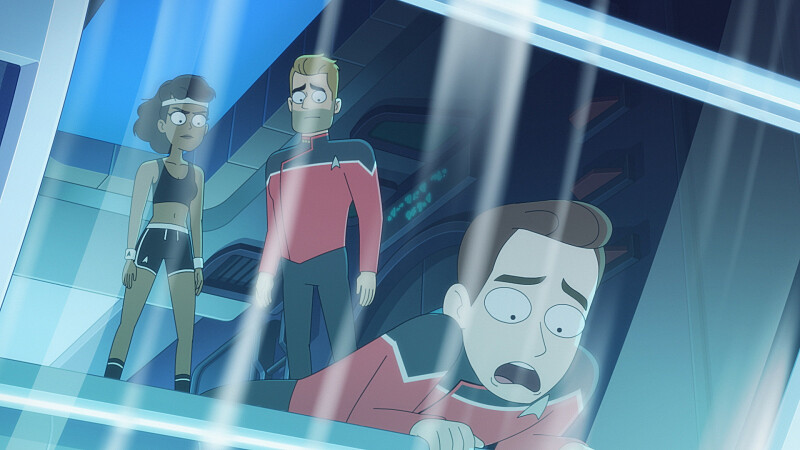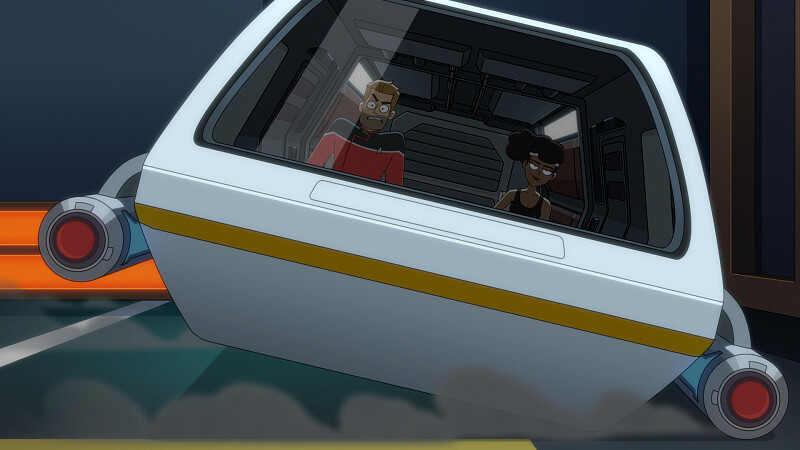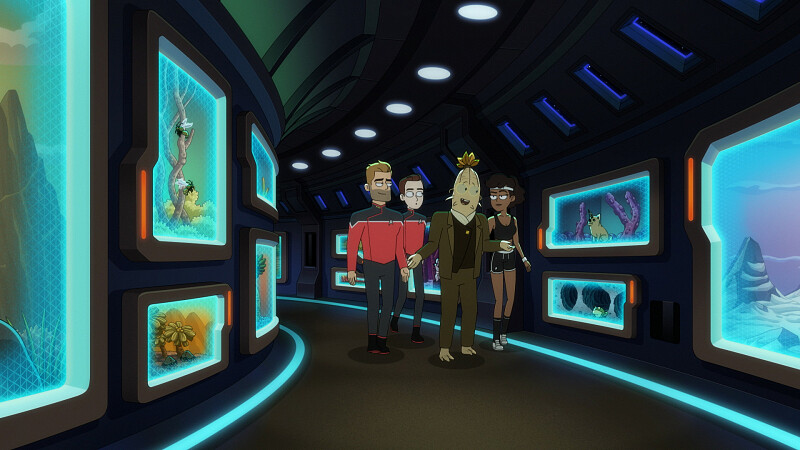This discussion and review contains spoilers for Star Trek: Lower Decks season 4, episode 2, “I Have No Bones Yet I Must Flee,” streaming now on Paramount+.
After a heavily nostalgic season premiere with “Twovix,” Star Trek: Lower Decks settles into a comfortable sitcom groove with “I Have No Bones Yet I Must Flee.”
Of course, the episode is still stuffed to the gills with references and in-jokes. The opening sequence sees the return of the Romulan Torture Chair from “The Mind’s Eye,” while there’s a wonderful reference to a classic Star Trek prop finally named “the Tucker Tubes.” The episode’s central plot is a riff on an archetypal Star Trek plot — perhaps the original archetypal Star Trek plot — as the crew visits “a classic menage” like that featured in “The Cage.”
However, “I Have No Bones Yet I Must Flee” uses these familiar elements as a framework on which to hang a triptych of sitcom storylines, all of which are built around the promotions of Mariner (Tawny Newsome), Boimler (Jack Quaid), and Tendi (Noël Wells) at the end of “Twovix.” Boimler tries to find the perfect quarters. Mariner deals with her insecurities over being promoted. Rutherford (Eugene Cordero) fears being left behind by his friends, and so commits to earning his own promotion.
This is something that Lower Decks is generally quite good at. Like so much modern Star Trek, most especially Star Trek: Strange New Worlds and the third season of Star Trek: Picard, Lower Decks is a show nostalgic for the aesthetic and the iconography of Berman era Star Trek, most notably Star Trek: The Next Generation. The Next Generation is arguably best understood as a drama about one of the best workplaces in the history of television, and so Lower Decks makes for a worthy successor as a workplace sitcom.
“I Have No Bones Yet I Must Flee” leans into this, threading that theme through each of the three major plot threads. The lightest of these three threads focuses on Boimler and his living arrangements. This thread makes a reasonable amount of sense on its own terms. After all, the corridor bunks have long served as a central location for the show, with the four main characters sharing that space — often at the beginning and end of each episode.

L-R Tawny Newsome as Ensign Beckett Mariner and Jerry O’Connell as Commander Jack Ransom appearing in episode 2, season 4 of Lower Decks streaming on Paramount+, 2023. Photo Credit: Paramount+
It is a little emotional to bid farewell to that familiar setting, even if it is just a collection of animated backgrounds rather than a physical space. That final shot of the empty corridor is oddly affecting. It also literalizes the characters’ career mobility, in that they are literally moving up the ranks. Lower Decks is a Star Trek show that is fundamentally about the modern workplace, and it makes sense to focus on the physical spaces occupied by these characters.
Still, Boimler’s misadventures are the weakest part of the episode — a collection of predictable jokes about looking for a new apartment. These punchlines never feel particularly specific to Star Trek, and so could have been lifted from any sitcom over the previous fifty years. Boimler’s first set of quarters suffers from a terrible view, while his second is affected by noisy neighbors. Sure, the actual particulars – the warp nacelles and the holodeck – are specifically Star Trek, but the gags are familiar.
To be fair, this is the point. Star Trek has always been more about the modern world than some imagined future. Lower Decks often argues that the future of work is unlikely to be very different from the modern reality of it, especially for those on the lower rungs of the ladder. That universality makes sense. Unfortunately, the gags themselves just aren’t funny enough. These are the sorts of punchlines that have been done countless times before, better, on other shows.
The Rutherford plot is more effective. It leans into that nostalgia for the feeling of The Next Generation rather than any specific continuity. Tied to that idea of The Next Generation as a workplace drama, a large part of the appeal of the show was watching characters being good at their jobs. Zaki Hasan described it as “competence porn.” The Rutherford plot in “I Have No Bones Yet I Must Flee” is in many ways about competence, particularly in a highly competent environment.
More than any other member of Lower Decks’ leading quartet, Rutherford is defined by his competence. He might even be too competent. His greatest failures are rooted in creating objects that are too sophisticated, most notably the psychopathic computer program known as “Badgey” (Jack McBrayer). As such, there is something inherently charming in the idea of Rutherford’s belief that he can earn a promotion in a single shift — and that he already turned down several promotions.
It’s fun to watch Rutherford offer Chief Engineer Billups (Paul Scheer) small enhancements, only to discover that these enhancements have been (barely) surpassed by his professional rival. It’s the low stakes that make the plot so fun to watch. This carries through to the resolution, where Rutherford learns an important lesson about work. He just asks Billups for a promotion to which he is already entitled. “Wait, I can just ask for stuff I deserve?” he gasps. It’s a utopian view of labor relations.

L-R Jerry O’Connell as Commander Jack Ransom and Tawny Newsome as Ensign Beckett Mariner appearing in episode 2, season 4 of Lower Decks streaming on Paramount+, 2023. Photo Credit: Paramount+
However, the meat (and marrow) of “I Have No Bones Yet I Must Flee” lies with Mariner. One of the most consistently impressive aspects of Lower Decks is the extent to which the show has developed its central characters. More than any of the other modern Star Trek shows, Lower Decks understands the internal psychology of its leads. Boimler, Mariner, and Tendi all feel like fully-formed individuals with complicated dynamics. Rutherford is drawn a bit more broadly, but he still makes sense.
“I Have No Bones Yet I Must Flee” is built around the idea that Mariner will fundamentally self-sabotage. The show has established that she has a strong self-destructive streak. She has been promoted and demoted several times. She has left Starfleet. Her relationships with many of the people in her life, including her own mother (Dawnn Lewis) and Boimler, can be fraught. Lower Decks has consistently argued that this comes from a place of low self-esteem, masked by her bravado.
“I Have No Bones Yet I Must Flee” demonstrates this by focusing on Mariner’s reaction to her promotion. She stumbles on Commander Ransom (Jerry O’Connell) and Lieutenant Shaxs (Fred Tatasciore) gossiping in the ship’s gym like Deanna Troi (Marina Sirtis) and Beverly Crusher (Gates McFadden) in “The Price.” When she overhears Ransom boasting that she won’t be his “problem” for long, she immediately sinks into paranoia.
Convinced Ransom is setting her up to fail, Mariner commits to failing on her own terms as quickly as possible. “I’m going to become an insubordination supernova and control my own fate,” she boasts to her colleagues. “When I get demoted, it’s gonna be because I earned it.” Assigned to a mission to an alien menagerie (“basically just a big-ass alien zoo full of aliens run by another alien”) with Commander Ransom and Ensign Gary, Mariner tries to provoke Ransom into demoting her.
As with the Boimler and Rutherford plots, this is a classic sitcom setup. It hinges on the fraught interpersonal and professional dynamics between Mariner and Ransom. Gary even explicitly acknowledges this. “Are you guys… breaking up or something?” he asks, rendering the subtext as text. “Yeah, we are,” Mariner answers. “As co-workers. And we’re gonna force it, right now.” Gary replies, “I’m having a little trouble decoding the dynamic here, but I’d really like to be left out of it.”
Of course, Mariner’s plot ultimately has a happy ending. This is Lower Decks tapping into that classic Next Generation optimism by way of sitcom genre conventions. Unlike Seinfeld, there is hugging and there is learning. Ransom points out that Mariner’s greatest enemy is her own insecurity. “I do not try to get demoted,” Mariner insists. “You always do,” Ransom counters. However, Ransom commits to his responsibility as her superior. He won’t let her self-sabotage. He will protect her from herself.

L-R Jerry O’Connell as Commander Jack Random and Tawny Newsome as Ensign Beckett Mariner appearing in episode 2, season 4 of Lower Decks streaming on Paramount+, 2023. Photo Credit: Paramount+
It’s a sweet little dynamic, one that adds a layer of complexity to both Mariner and Ransom while also remaining true to the franchise’s trademark utopian outlook. If Lower Decks is a show about work, then Ransom is trying his best to be a good boss — and that means helping Mariner to be her best self. This sort of inherent contradiction, the conflict between the brash extrovert that Mariner presents to the world and the vulnerability she really feels, is legitimately compelling character work.
It is a nice reminder that, beneath the sitcom tropes and nostalgic references, Lower Decks is really good at developing these characters. Mariner feels real in a way that many Star Trek regulars do not. It is rare for a Star Trek lead outside of Star Trek: Deep Space Nine to demonstrate this sort of interior life, and it is often driven by performance rather than writing. Despite being animated, Mariner demonstrates more dimensionality than any of the leads on Picard or Strange New Worlds.
More than that, there’s just an impressive efficiency to “I Have No Bones Yet I Must Flee,” particularly following “Twovix.” Lower Decks is not a serialized show. Indeed, it’s frustrating to think that the episode’s opening scene in which a Romulan ship is attacked by a mysterious alien probe is likely to be the season-long arc. However, the show has proven itself capable of developing threads and ideas across multiple episodes.
“I Have No Bones Yet I Must Flee” is not a direct continuation of “Twovix” in any literal sense, but each of its three storylines flow naturally from the promotions at the end of that episode. There is a sense in which Lower Decks is honestly and sincerely grappling with the promotion of its four leads. Deep Space Nine did something similar at the end of its third season, when it promoted Commander Benjamin Sisko (Avery Brooks) to Captain, signaling a maturity for the series.
As with the use of Voyager nostalgia in “Twovix,” this emphasis on growth in “I Have No Bones Yet I Must Flee” feels like Lower Decks asserting itself. These characters are not frozen in time, and have worked hard enough to advance. They have put in the hours. The same is true of the show itself, as it bids farewell to its iconic corridor bunks. In these recent episodes, Lower Decks asks its audience to take it seriously. Like Rutherford, the show has learned that it can ask for stuff that it deserves.
